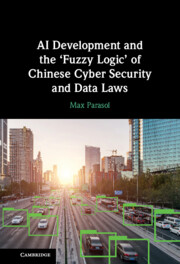Book contents
- AI Development and the ‘Fuzzy Logic’ of Chinese Cyber Security and Data Laws
- AI Development and the ‘Fuzzy Logic’ of Chinese Cyber Security and Data Laws
- Copyright page
- Contents
- Detailed Contents
- Acknowledgements
- Abbreviations
- Introduction
- Part I Historical and Doctrinal Background
- 1 Innovating in China’s Entrepreneurial Ecosystem
- 2 The Extent of Fuzzy Logic
- 3 China’s Cyber Policies
- 4 China’s Data Security Policies Leading to the Cyber Security Law
- 5 The Cyber Security Law
- Part II Impact on Artificial Intelligence
- Conclusion
- Bibliography
- Index
2 - The Extent of Fuzzy Logic
The Tech Giants and Their ‘Illegal’ Legal Structure
from Part I - Historical and Doctrinal Background
Published online by Cambridge University Press: 16 December 2021
- AI Development and the ‘Fuzzy Logic’ of Chinese Cyber Security and Data Laws
- AI Development and the ‘Fuzzy Logic’ of Chinese Cyber Security and Data Laws
- Copyright page
- Contents
- Detailed Contents
- Acknowledgements
- Abbreviations
- Introduction
- Part I Historical and Doctrinal Background
- 1 Innovating in China’s Entrepreneurial Ecosystem
- 2 The Extent of Fuzzy Logic
- 3 China’s Cyber Policies
- 4 China’s Data Security Policies Leading to the Cyber Security Law
- 5 The Cyber Security Law
- Part II Impact on Artificial Intelligence
- Conclusion
- Bibliography
- Index
Summary
This chapter explains the extent of fuzzy logic law surrounding the legal structure of technology companies in China. The chapter provides a profound illustration of the environment in which Chinese entrepreneurs must operate and remains an ongoing story. From the outset, Chinese technology entrepreneurs must decide how to legally structure their companies in order to account for vague conceptions of legality.
- Type
- Chapter
- Information
- Publisher: Cambridge University PressPrint publication year: 2021

